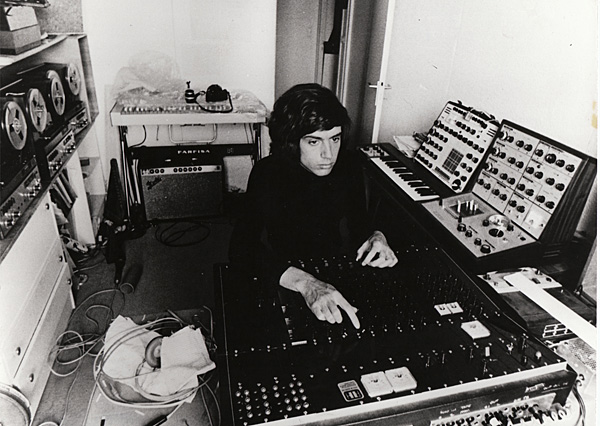| Columns Retired Columns & Blogs |
I'm crazy for "Love Is Like Oxygène."
Love is like Oxygène.
You get too much,
you get too high.
Not enough and you're gonna die...
Jarre: I used the Memory Moog, and I just received the new Moog One, the polyphonic synthesizer. This is going to be one of the Stradivariuses of electronic music. It has that very deep analog sound, it has real polyphony, and it's three synths in one. And I'm using lots of plugins also. I used the very classic machines, like the modular Moog and modular ARP, the EMS VCS 3, and a granular-synthesis synthesizer from a young guy [Tasty Chips Electronics] in the Netherlands, the GR-1 Granular Synthesizer. You can do granular synthesis with many devices these days, but this is so easy to use, and practically instant. This instrument didn't exist when I began this project.
Micallef: If someone were to listen to the original Équinoxe and then to Équinoxe Infinity, would they hear parallels between them?
Jarre: Yes. But I wanted to just, to keep the texture of the first one and the idea of the continuous mix.
Micallef: We hear a Mellotron in "Robots Don't Cry," on Équinoxe Infinity. It sounds oddly serene in that futuristic environment.
Jarre: The Mellotron is the first electrical-mechanical instrument. Perhaps in the future, robots will be nostalgic for the first elements of technology that they have in themselves.
Micallef: Is there any difference between the vinyl and CD releases of Équinoxe Infinity?
Jarre: No, it's the same, vinyl and CD, as well as limited-edition cassette. If you watch Ready Player One, from Spielberg, or Guardians of the Galaxy or Deadpool, they're all referring to mixing sci-fi with '80s music and they're playing audio cassettes. So I thought it could be fun to create a cassette.

Micallef: Was there any particular track or moment in the creation of the record that presented a challenge?
Jarre: "Robots Don't Cry" is something I did in one go, which is quite rare in electronic music. The drum machine I used for the first Équinoxe, the Korg Mini Pops, a very old drum machine, is in "Robots Don't Cry." I played that, and then I improvised on the Mellotron. I did that whole melody in one go—just took that chance. The second challenge was the last piece, "Équinoxe Infinity," where I wanted to create this kind of journey where you maintain harmony between sounds but with a maelstrom of different sounds, from vocals to metals, and distorted types of sounds, all mixed in a similar harmonious way, but everything actually moving in a random way. So in terms of composition, that was more challenging.
Micallef: You've played some epic concerts, as in Riyadh and China, and you're planning solar-powered concerts. What's next for your live performances?
Jarre: It's very important for musicians to play in countries that need music and culture. I'm against any kind of boycott. I performed in Saudi Arabia because 50% of the audience is under 30 years old. For the first time ever in Saudi Arabia, we did a concert outdoors in front of 50,000 people, including women and men together—the first time you could see women dancing and clapping with men in attendance at a concert. It was very moving, because it [had] never happened before.
I mentioned my mother being a great figure in the French Resistance, and she always told me you have to understand the difference between ideology and people. In those days, it was not that common in Europe to make a difference between the Nazis and the German people. The agenda of artists is different from the politicians. Today, we should go to Iran. We should go to North Korea and make music. We, as artists, are talking to the people, and if you don't go there, to the people who don't have the same freedoms as we have, it's essentially double punishment. If you refuse to give those people access to music and art and culture, then you're collaborating with radicalization and to alienation. You have to go there. Artists should go to North Korea. This is the only work with which we can ease the process for the next generation. [Note: Jarre was the first Western musician invited to perform in the People's Republic of China. Recordings from the resulting concerts in Beijing and Shanghai, in 1981, were released in 1982 on The Concerts in China.—KM]

Micallef: What was your response to receiving the Stephen Hawking Medal for Science Communication, Music & Arts, in 2017?
Jarre: A big honor, because I've been heavily influenced by Stephen Hawking's work on time and space and time warps. I recorded Chronologie [1993], an album dedicated to him. It was a big privilege and honor to meet with such a man, and he was absolutely incredible. When I received the medal, he said, "We certainly have to leave Earth in one century to colonize other planets, if we go on like this. Otherwise Earth will not be able to welcome 15 billion people." People said he presented a very disturbing and dark future, but he was like Christopher Columbus. Maybe it's the destiny of mankind to go to space and expand ourselves.
Micallef: Hawking was also wary of artificial intelligence, writing, "A super-intelligent AI will be extremely good at accomplishing its goals, and if those goals aren't aligned with ours, we're in trouble."
Jarre: And he said something very funny. When asked, "What mystery do you find most intriguing, and why?" Hawking said, "Women. My PA reminds me that although I have a PhD in physics, women should remain a mystery." (footnote 1)
Micallef: Finally, I'm curious: What's your favorite Fellini movie?
Jarre: It would be two, Satyricon and Amarcord. Those are the real impressionist movies that influenced me very much, and I consider my music quite impressionistic. Fellini was able to convey emotion with almost nothing. And Prova d'orchestra [Orchestra Rehearsal] too. That's very funny.

I'm crazy for "Love Is Like Oxygène."
Love is like Oxygène.
You get too much,
you get too high.
Not enough and you're gonna die...

Written by Andrew Scott / Trevor Griffin
Album: Level Headed 1978
Cheers,
Terry

Sweet is ......
"Sweet Child O' Mine" ......... Guns N' Roses :-) ..........

Or, could be a .........
"Fox On the Run" ......... The Sweet :-) .........

... inspired me to dig out my Polydor LP of Oxygène, run it through the Spin Clean and play it. I had mostly forgotten what a fine album this is. Not sure I've played it since 1980 or so.
Nice to see it's also available on 8 Track and Cassette :-) according to the back cover.